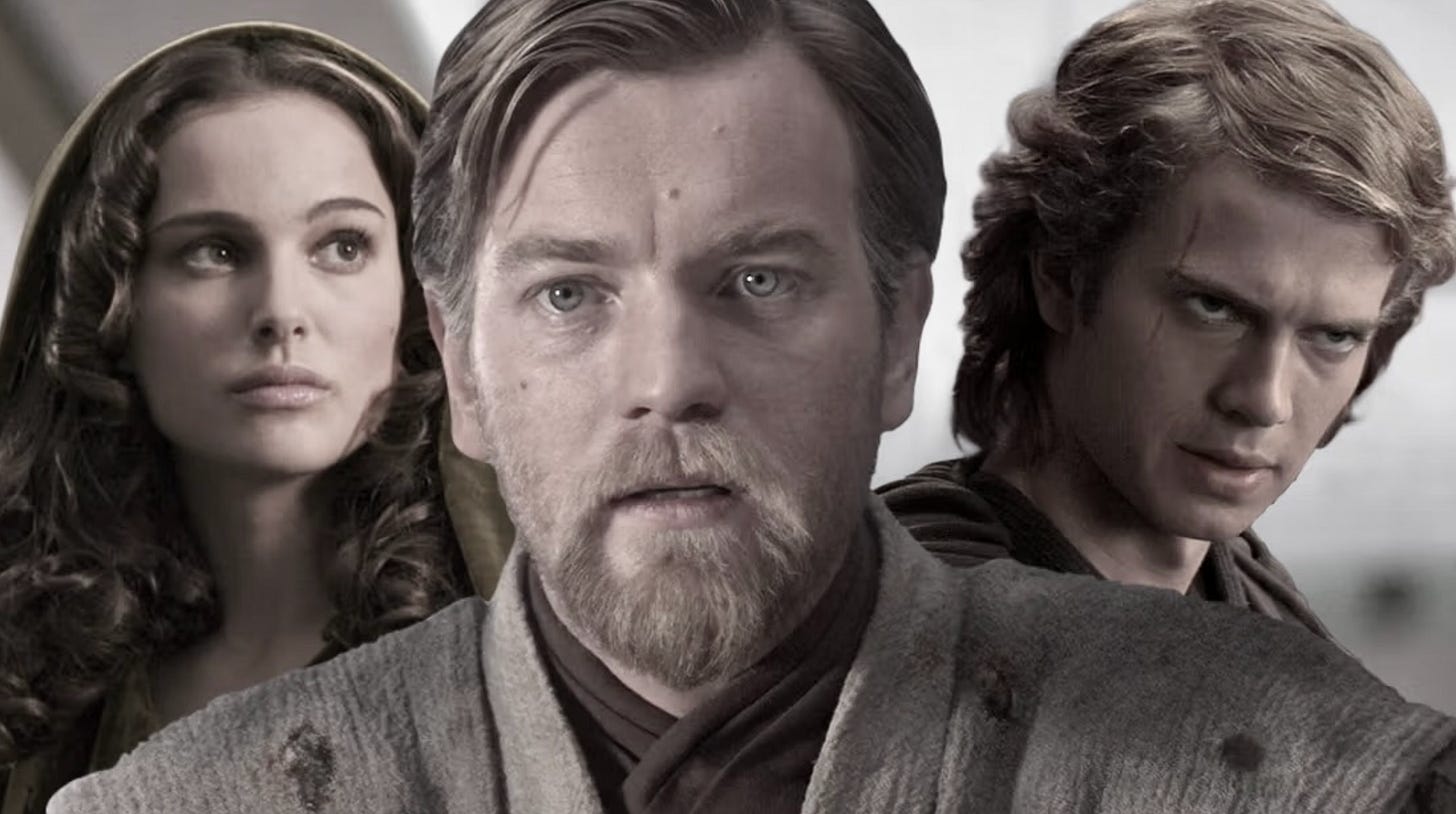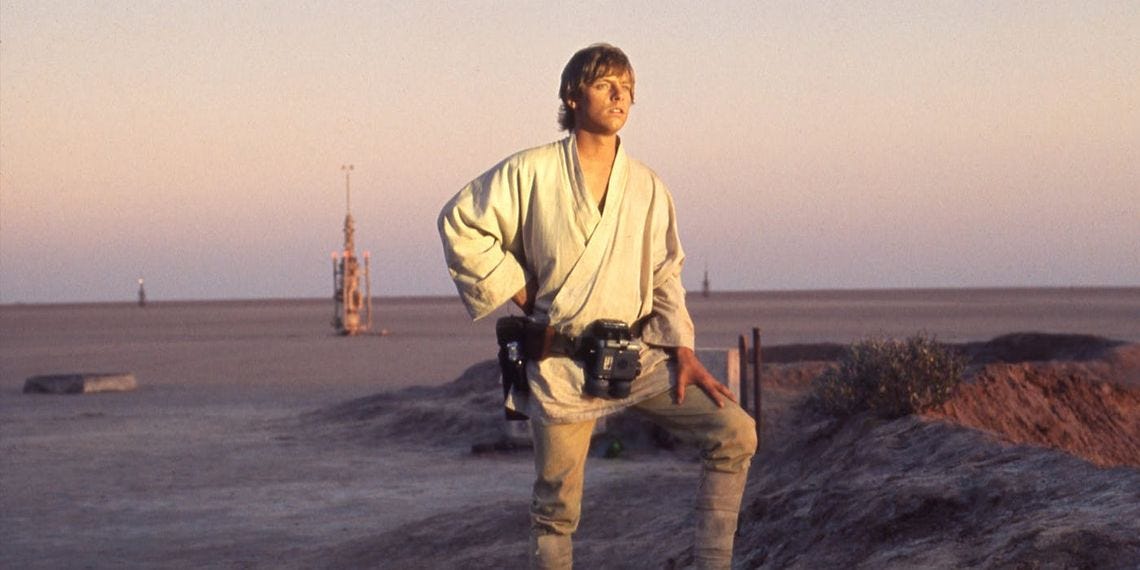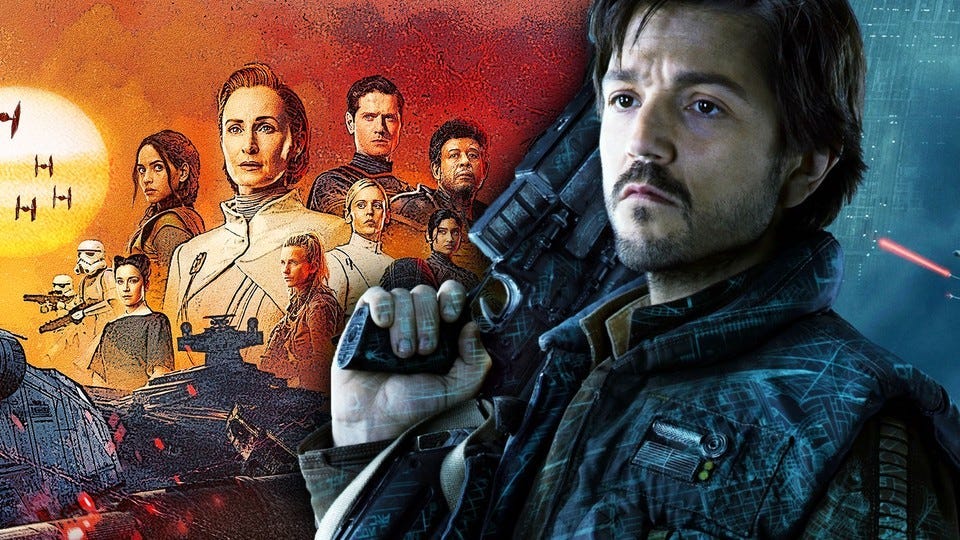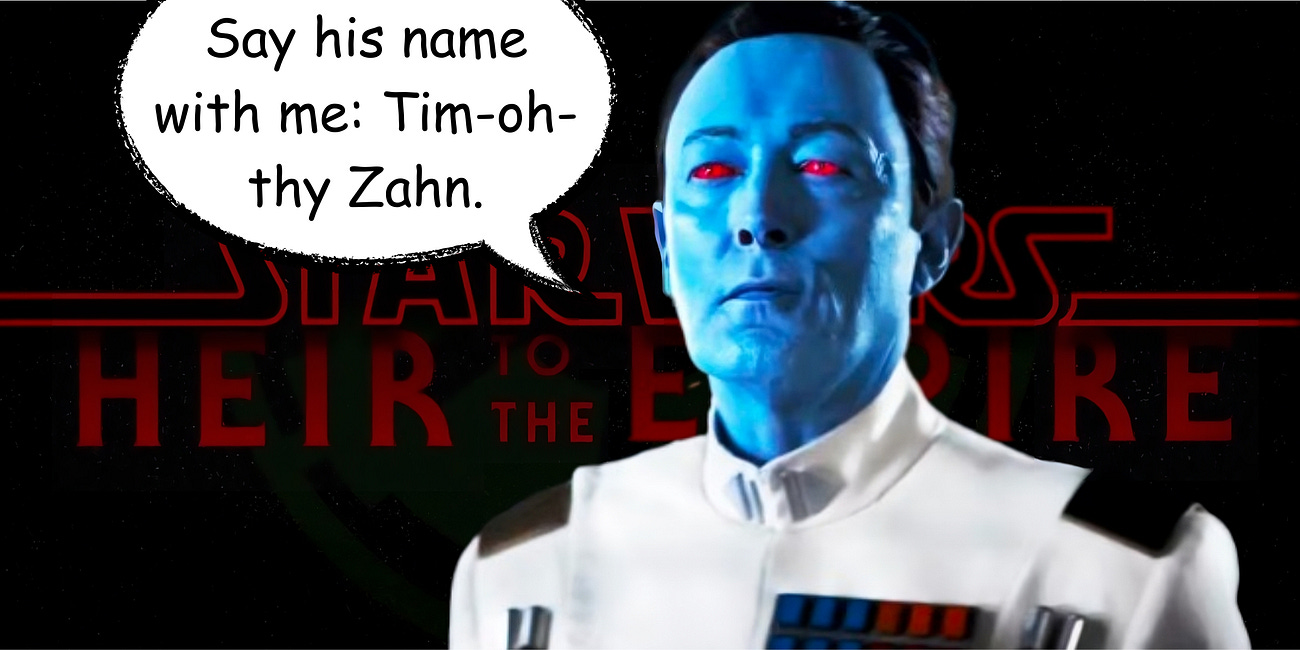What Really Went Wrong With the 'Star Wars' Prequels...Maybe
I have a theory about George Lucas's original, far more tragic intentions for the central relationships of his Prequels - which could help you learn how to better interrogate films in general
In case you clicked on this link to hear me rail against the Star Wars Prequels, I just want you to know that won’t be happening here. Aside from my general disdain for shitting on other people’s art in public spaces, I’m of the opinion that George Lucas’s sometimes maligned prequels to the Original Trilogy are quite good despite their faults. In fact, I’ve come to believe Lucas eerily predicted the general rise of fascism in the West in the 21st century with these deeply authored films. They each have a bespoke quality to them, as well as a depth the Original Trilogy lacked that’s born from Lucas’s own anti-imperialism/colonialism/establishment views. Revenge of the Sith, in particular, ranks among my top three favorite films in the Skywalker Saga as we are now expected to call the three trilogies. So, what are we doing here today? Good question from the back of the room. Today, we’re going to instead theorize, with evidence, about a dramatic course correction Lucas made after the release of The Phantom Menace. Even if I’m wrong – and I don’t believe I am – this exercise will be useful in helping you learn how to deconstruct films. In doing so, you begin to understand how to write them yourself.
To begin, let’s consider three things:
Lucas constructed his six Star Wars films, in part, using mythological tropes popularized by Joseph Campbell and his Hero’s Journey. Many of the tropes – and other story elements – used in the Original Trilogy are repeated, or echoed, in the Prequels. Just check out The Phantom Menace, in which Anakin Skywalker reacts to his Call to Adventure in the exact same way his son does in A New Hope. A wise mentor dies at the end of Phantom Menace, a wise mentor dies at the end of New Hope. Anakin’s hand gets cut off in The Attack of the Clones, Luke’s hand gets cut off in The Empire Strikes Back. The Arthurian love triangle at the center of the Prequels, the Arthurian love triangle at the center of the Original…wait, what?
In the Original Trilogy, the Arthurian love triangle established in A New Hope consists of Luke Skywalker, Han Solo, and their mutual love interest Leia Organa (this is before the creepy incestuous stuff blew up the threesome’s tension). Meanwhile, The Phantom Menace introduces us to the Prequel Trilogy’s three protagonists: the “Chosen One” Anakin Skywalker, the “warrior” Obi-Wan Kenobi, and “the queen” Padmé Amidala. Anakin is 9 years old, Obi-Wan is 25, and Padmé is 14 – too old for Anakin and too young for Obi-Wan to fall in love with…for now. By the time we reach The Attack of the Clones, ten years have passed. Anakin is now a young man, Obi-Wan is 35 (less a father figure than a brother, which he will emphasize in The Revenge of the Sith), and Padmé seems to exist in age/maturity somewhere between the two. Hm, que misterioso, padawans.
In the King Arthur myth, Arthur is a young man who is called to adventure when he pulls a sword from a stone. You might even say he was chosen by supernatural forces because that’s what happens. As a result, he marries Guinevere and forms the Knights of the Round Table with his closest friend and greatest warrior, Lancelot, in charge of it. Problematically, Queen Guinevere isn’t as turned on by her Chosen One as she is by the Chosen One’s warrior friend/brother. Arthur, in turn, crumbles and brings an end to the glory and prosperity of his kingdom. See where I’m going with this?
Chosen One…warrior…queen.
Arthur…Lancelot…Guinevere.
Anakin…Obi-Wan…Padmé.
So, now, ask yourself this: why would Lucas carefully create an Arthurian love triangle, one that perfectly mirrors the relationship roles of the actual King Arthur myth, if he didn’t intend to use them in some way? Because, unlike the Original Trilogy — which merely apes a familiar triangle of affections — this explosive, ultimately destructive dynamic is far more explicit in the Prequels.
And now we get to my argument, which I believe makes a lot more sense than the relationships that actually played out onscreen in Attack of the Clones and Revenge of the Sith:
Lucas didn’t originally intend for Anakin to fall to the Dark Side because he was afraid he was going to lose Padmé to childbirth.
I’m confident the original intention was that Anakin would fall in love with Padmé, Padmé would also fall in love with Obi-Wan, and Obi-Wan and Padmé’s betrayal would — as it did with Lancelot and Guinevere — drive the Chosen One to turn to the Dark Side and bring about the ruination of the Republic.
What I’m saying is, Anakin’s fall from grace was going to be caused by the noble Obi-Wan’s inability to keep it in his pants. Of course, Padmé plays a role in this melodrama; it’s not like she wasn’t as interested in Obi-Wan’s lightsaber as he was her, um, vigorous political positions.
Sorry, I couldn’t help myself there.
In this scenario, Anakin’s spiritual fall is lightyears more dramatic and emotionally gutting as he is, in many ways, a victim of those he loves most. Padmé also becomes a tragic character with her own agency rather than just existing as a function of Anakin’s fall (and to push out Luke and Leia before dying from a broken heart). Most importantly, it makes Obi-Wan much more interesting going into the Original Trilogy. So much so, it would completely reframe our understanding of the Original Trilogy, as his role in them would secretly be one of redemption from tragic villain to galactic savior.
So, there you have it – my crazy Prequel Trilogy theory. I’m not sharing this with you as a piece of fan fiction. I don’t want to hear how you wish these were the relationships you actually got in the Prequels or other versions you also hoped for. I want you, as storytellers, wherever you are on your journey, to pause and consider the possibility I’m right, ask yourself why Lucas might’ve abandoned this trajectory (similar to how he also scrapped Jar Jar Binks as a major character), and what might’ve been gained (or lost) had he not. Moreover, I want you to consider how interrogating the Prequels in this way might help you do similar with other films, breaking down their structural mechanics to understand their character arcs and thematic layers better. In doing so, “you will take your first step into a larger world,” as Obi-Wan Kenobi once told the son of a Jedi he cuckolded in a parallel Star Wars universe.
If this article added anything to your life but you’re not up for a paid subscription, consider buying me a “coffee” so I can keep as much of this newsletter free as possible for the dreamers who couldn’t afford it otherwise.
If you enjoyed this article, these other three might also prove of interest to you:
Luke Skywalker Isn't the Hero You Want Him to Be
If you’re a serious STAR WARS fan, you almost certainly know the Original Trilogy was constructed around Joseph Campbell’s theory of the monomyth, or, as it’s more commonly known, the “hero’s journey”. In his book, THE HERO WITH A THOUSAND FACES (1949), Campbell proposed a common template of stories — what you might call a repeating pattern of myths acr…
How Tony Gilroy Made 'Andor' One of the Best Series on TV
When “ANDOR” was announced, it’s fair to say it was greeted with a generally unenthusiastic shrug even by the STAR WARS fans (such as myself) who believe ROGUE ONE: A STAR WARS STORY is one of the best films the franchise has ever produced. Andor, played by
Lucasfilm’s Disregard for the O.G. Heir to the 'Star Wars' Empire Is Part of a Larger Entertainment Industry Problem
I was sixteen the first time I saw a copy of the STAR WARS novel HEIR TO THE EMPIRE in the hands of one of those “cool kids” from high school who had made my life a living hell for loving “geek shit” as he would invariably refer to STAR WARS, STAR TREK







You could TOTALLY be onto something here, since this storyline made it as far as Palpatine implying to Anakin that his bride and Obi are involved, and those cut scenes are available for anyone to find on YouTube, before they were cut from ROTS.
I think Lucas scrapped the whole thing because fundamentally, he meant these to be kids' movies. It was already bad enough that the last film was SO dark, but he probably didn't want parents to have to deal with kids upset that Amidala and Obi Wan did that to poor Anakin.
I think you are TOTALLY right about how prescient these films are. I look at the Trade Federation having a seat in the Senate for Chrissakes, and there it is ... things like Citizens United and it's obvious how GL felt about all that and where he thought it would lead.
It was all lost on an audience that was only there for the whiz-bang, though, and the complaints that "the political scenes are BORING!" persist to this day.
People are so stupid.
I think it's possible that's how the arc started. However, when compared to what we got on screen, it's a situation where there isn't enough at stake. Darth Vader's ascension would not have been truly tragic if it was sourced only in a love triangle. It had to be a love triangle where what was forbidden and yet indulged in brought the entire galaxy to a pivotal point where one man's moral failure to overcome his inability to control his fear of loss ended up toppling a civilization thousands of years old. It allowed Lucas to tell the story of how organized religions and all political institutions, no matter how holy or sanctified, always become corrupted under their own machinations. The Star Wars Prequels present corruption, not as an element of sexual desire fulfilled, but rather as a moral and spiritual failure to let go and trust Natural Law to unfold as it will. Also, by keeping Padme's love pure (like Harry Potter's mother), it imbues Luke and Leia's situtation with love and sacrifice.
No one shits on the Star Wars Prequels in my presence. As you say, George Lucas taught a generation of school children and adults about how Fascism grows and corrupts first in the heart and then in the Senate.